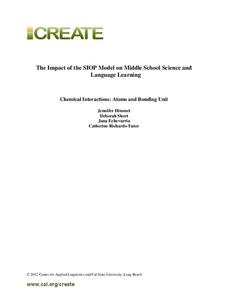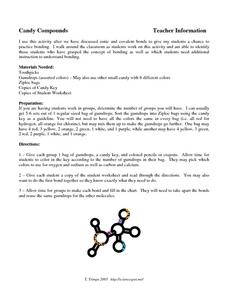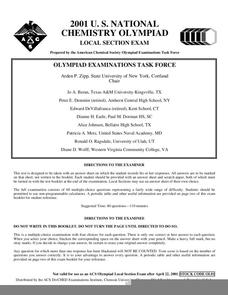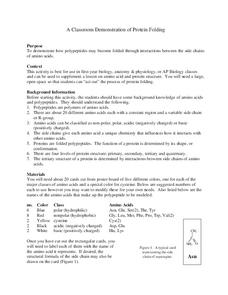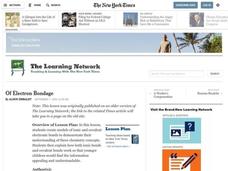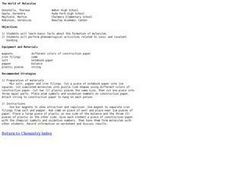Curated OER
Bhopal - Covalent Bonding
Using the chemicals that leaked in the Bhopal gas tragedy of 1984, chemists examine covalent bonds. Provide for them the chemical reactions and have them draw Lewis diagrams for the molecules involved. That's about all there is to the...
Curated OER
Types of Bonding Lab
Chemistry lab learners experiment to identify a series of unknown compounds. They choose which tests to perform, but you may suggest melting or boiling point, solubility, electrical conductivity, and malleability. This is a terrific...
American Chemical Society
Represent Bonding with Lewis Dot Diagrams
Lewis dot diagrams, Lewis dot structures, and electron dot diagrams are all the same thing. Young scientists learn how to draw Lewis dot diagrams and come to understand how dots and dashes represent valence electrons and ionic or...
Curated OER
Hydrocarbons
Making models is always memorable. In this activity, physical science starters examine the structure of hydrocarbons using marshmallows, raisins, and toothpicks. They even act as atoms themselves and link arms to represent covalent...
Curated OER
Physical Science Review Questions
Prepare your class for a quiz with these physical science review questions. Learners respond to 7 questions about ionic and covalent bonds, oxidation states, and chemical and physical changes. In addition, they name compounds and balance...
Center for Applied Linguistics
Chemical Interactions: Atoms and Bonding
Watch budding chemists interact with the resource on chemical interactions. In the unit, six lessons provide an overview of basic chemistry, from understanding the development of atomic theory to distinguishing between ionic and covalent...
Curated OER
Ionic Bonding
This clear overview of ions and ion formation will be useful for either review or note taking. Each slide has quite a lot of text on it, but they are bullet pointed well, and you could edit the slideshow to have facts appear separately....
Curated OER
Ionic and Covalent Bonds
Ionic and covalent bonds are the focus of this chemistry activity, which provides learners with eighteen key terms to use in a fill-in-the-blank activity. Additionally, students are prompted to write the number of atoms in four given...
Curated OER
Covalent Bonding - Electron Dot Structures
A short paragraph helps explain how covalent bonds are formed, and then your class will complete the Electron/Dot and Structural diagrams for the molecules given. The valence diagrams will reinforce understanding. This activity would be...
Curated OER
Amazing Carbon
Explore carbon and bonding with this learning exercise. First, class members read a short excerpt about carbon and its characteristics. In response to the reading, they draw an electron dot diagram of carbon as well as diagrams of...
Curated OER
Call Me Bond, Hydrogen Bond
As amazing as James Bond is, the surface tension of water does not allow him to walk on it! In this series of little lab activities, physical scientists play with the properties of water due to the hydrogen bonds and resulting polarity....
Curated OER
Candy Compounds
In this compounds worksheet, students are given a bag of colored gumdrops that represent specific atoms. They construct ionic and covalent bonds with gumdrops using the key provided and the compounds to build. They fill in a chart with...
It's About Time
How Atoms Interact with Each Other
Connect the dots and assist young chemists as they demonstrate covalent and ionic bonding. Class members use their knowledge of valence electrons to predict compound formulas as they arrange electrons into various bonding structures to...
Curated OER
2001 U.S. National Chemistry Olympiad - Local Section Exam
Sixty multiple-choice chemistry questions make up this comprehensive exam used for the 2001 US National Chemistry Olympiad. Every topic that you would expect to approach in a general chemistry class is queried on. You could easily use...
Cornell University
Fibers, Dyes, and the Environment
Nanofibers can be made through electrospinning or force spinning in order to reduce the negative impact on the environment. Pupils study the role of fibers and dye on the environment through a series of five hands-on activities. Then,...
Royal Society of Chemistry
Shapes of Molecules—Hybrid Orbitals
Take your chemistry class' knowledge of molecular geometry to the next level! Introduce orbital hybridization with a series of related games. Individuals complete a data table in the first activity, then solve Sudoku-like puzzles using...
Curated OER
Laboratory: Modeling Molecular Shapes
In this molecules worksheet, students answer post lab questions about types of bonds, factors that determine polarity and molecular geometry. They calculate electronegativity differences in atoms and determine the types of bonds between...
Curated OER
IPC Review
Learners discuss the difference between atoms and elements. They analyze how compounds are formed. Students discuss the difference between covalent bonds, hydrogen bonds, and ionic bonds. They review bonding with diagrams, "Atoms or...
Royal Society of Chemistry
Shapes of Molecules—Geometry of Central Atom
How is a molecule's shape determined? Explore bond angles, lone pairs, and VSEPR theory through a logic-based activity. Chemists pull together information about the major molecular shapes, then use it to solve puzzles.
Royal Society of Chemistry
Shapes of Molecules—Distortion from the Pure Geometry
Ready to introduce the realities of molecular geometry to chemistry pupils? Use a logic-based interactive! Perfect as individual practice, the puzzles explore the bond angles and repulsions present in three common molecular shapes.
Southwestern Medical Center
A Classroom Demonstration of Protein Folding
Does the mention of proteins and polypeptide relationships in your classroom result in mass confusion? Does the attempt to teach this important concept generate multiple questions and, at times, lead to a room filled with blank stares?...
American Chemical Society
Energy Levels, Electrons, and Ionic Boding
Learners see how electrons are transferred in the bonding of NaCl. They then create models of NaCl using styrofoam balls and toothpicks to assist them in explaining the formation of ions and ionic bonding.
Curated OER
Of Electron Bondage
Students create models of ionic and covalent electronic bonds to demonstrate their understanding of these chemistry concepts. They explain how both ionic bonds and covalent bonds work so that younger students can understand.
Curated OER
The World of Molecules
Students investigate molecules through 2 demonstrations and writing formulas for molecules given the oxidation states of the atoms. In this molecules lesson plan, students observe iron filings being separated from salt and pepper using a...







